Hezbollah's Anti-Lebanese Govt Campaign Announced
Hezbollah Announces Its Campaign To Bring Down The Lebanese Government
 Sophie McNeill writes: Hezbollah
leader Sayed Hassan Nasrallah ended days of apprehension
yesterday by announcing his guerrilla movement's plans for
civil disobedience intended to topple the Lebanese
government.
Sophie McNeill writes: Hezbollah
leader Sayed Hassan Nasrallah ended days of apprehension
yesterday by announcing his guerrilla movement's plans for
civil disobedience intended to topple the Lebanese
government.
In a speech on Hezbollah's own television station, Al-Manar, he called for "peaceful" street action to begin Friday afternoon in the centre of Beirut, saying that the current US backed cabinet of Prime Minister Fouad Saniora had failed because it was a 'one camp government' that did not represent all Lebanon's religious sects.
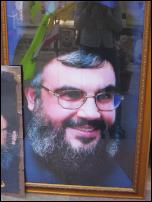 Pictured left: Hezbollah leader Sayed
Hassan Nasrallah."Lebanon, with its (sectarian)
makeup, cannot be administered by only one side," he said.
"This government has proved that it is unable to meet its
obligations and it has failed." In fact, it was the
withdrawal of six Shia ministers from the cabinet --
including two who are members of Hezbollah -- which left the
government without Shia Muslim representatives.
Pictured left: Hezbollah leader Sayed
Hassan Nasrallah."Lebanon, with its (sectarian)
makeup, cannot be administered by only one side," he said.
"This government has proved that it is unable to meet its
obligations and it has failed." In fact, it was the
withdrawal of six Shia ministers from the cabinet --
including two who are members of Hezbollah -- which left the
government without Shia Muslim representatives.
The country had been waiting for days to see how Hezbollah and its allies would respond to the huge anti-Syrian rally that followed last week's assassination of the Phalangist Christian Minister Pierre Gemayel.
Hezbollah supporters have been urged to carry only the Lebanese flag on Friday and to avoid the use of any party banners or posters; their statement calls "Lebanese of all sects and parties ... to gather peacefully and stage an open-ended sit-in to protest the absence of real political participation and to demand a national unity government."
But Nasrallah must know that the Christians, Sunni Muslims and Druse who support Siniora's government will not join their protest. It will be a primarily Shia demonstration intended to destroy a cabinet representing the rest of Lebanon; hence the danger.
The Lebanese Army has been ordered to quell any outbreak of violence, but it is a sign of this country's deep sectarian divide that Lebanese Army commander, General Michel Suleiman, felt it necessary yesterday to remind his troops to remain neutral in the coming days. "The country needs you and its citizens trust you," he said. "We are not going back to how things were in 1975." The Lebanese civil war, which began 31 years ago, cost the lives of at least 150,000 Lebanese and Palestinians.
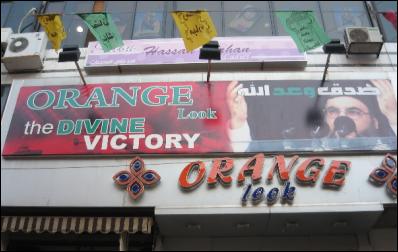
Here, the July war with Israel is referred to as 'the Divine Victory'.
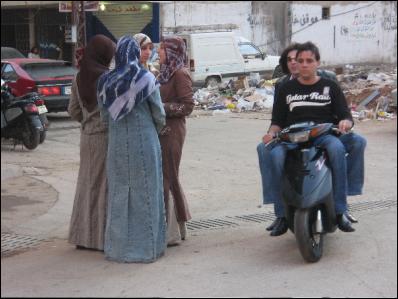
Streets of
Dahieh.
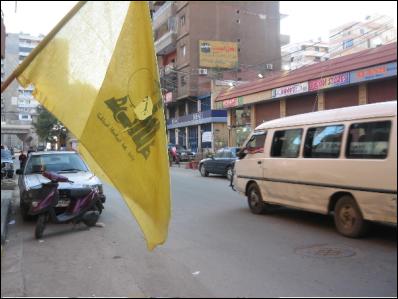
A Hezbollah flag flies
in the Shiite suburb of Dahieh in southern
Beirut.
Thousands of Lebanese troops were late yesterday on duty across the city of Beirut as Lebanon's crumbling government continued to try and rule. But in the southern suburb of Dahieh, the young bearded men of Hezbollah security still sit at each intersection with their walkie-talkies, closely monitoring any stranger who enters the perimeter of this large, crowded largely Shia Muslim neighborhood. "Can I check your bag pack please?"
As the stern faced security officer removes and carefully inspects my laptop, I feel I'm in an American airport. Except that these young men have about as much chance of getting near a U.S airport as Lebanon has of achieving political stability. Here in Dahieh, the shop windows are covered with posters of the man who has at last called upon his supporters to rally in the streets of the capital. The two seventeen-year-old girls sharing my taxi each have a picture of a smiling, bearded Nasrallah as the screensaver on their mobile phones. " We love him," they tell me, "He protects us."
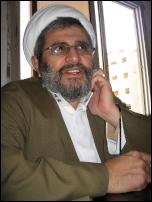 Hezbollah claims hundreds of thousands of
supporters like these will join them on the streets, but the
Shia political movement rejects any violent confrontation.
"As a resistance movement, we have only fought the Israeli
forces, and during the previous Lebanese civil wars we
didn't get involved," says fifty-year-old Sheik Khodor
Noureiden (pictured left) of the Hezbollah political
council. "Hezbollah gave its blood for Lebanon and we will
not permit others to destroy our country by having another
civil war." The mood here in Hezbollah territory is
markedly different from the fears voiced by many of the
anti-Syrian government supporters over the last week. In
Bir Al-Abed Street, the people know that if there is
violence, it is they who have the weapons. "I'm not worried
because we are stronger than they are," 20-year old Ladine
tells me. Sheik Noureiden believes Gemayel's assassination
has served only to hurt Hezbollah and Syrian interests, and
he accuses government forces of killing the minister in
order to harm the opposition. "Why would we or the Syrians
try to hurt ourselves?" he asks.
Hezbollah claims hundreds of thousands of
supporters like these will join them on the streets, but the
Shia political movement rejects any violent confrontation.
"As a resistance movement, we have only fought the Israeli
forces, and during the previous Lebanese civil wars we
didn't get involved," says fifty-year-old Sheik Khodor
Noureiden (pictured left) of the Hezbollah political
council. "Hezbollah gave its blood for Lebanon and we will
not permit others to destroy our country by having another
civil war." The mood here in Hezbollah territory is
markedly different from the fears voiced by many of the
anti-Syrian government supporters over the last week. In
Bir Al-Abed Street, the people know that if there is
violence, it is they who have the weapons. "I'm not worried
because we are stronger than they are," 20-year old Ladine
tells me. Sheik Noureiden believes Gemayel's assassination
has served only to hurt Hezbollah and Syrian interests, and
he accuses government forces of killing the minister in
order to harm the opposition. "Why would we or the Syrians
try to hurt ourselves?" he asks.
It's certainly true that Gemayel's death has created increased tension for Hezbollah's Christian political partner, Michel Aoun, and his Free Patriotic Movement. "They chose to kill Gemayel because they wanted to create problems among the Christians in Lebanon and especially with Mr Aoun who is our ally, " says Noureiden. "They want Aoun to split from us and they want to create the image in Lebanon that it is only the Shia who alone who are against all the others."
Noureiden believes a divided Lebanon suits those foreign powers that want to influence the country's internal affairs. "The Americans want civil war in Lebanon just like in Iraq," he says. "And why do they want an Iraqi civil war between the Sunni and Shiite? So they have a reason to remain there. And now they also want to destroy Lebanon so they have an excuse to be here too." King Abdullah of Jordan's comment this week -- that he is more worried about Lebanese violence than Iraq -- is seen by Hezbollah as another U.S. attempt to meddle in Lebanese affairs. "King Abdullah is always worried when the Americans are worried," scorns Noureiden. "And the Americans are worried because they are weak in Lebanon and the opposition against them is very strong."
Hezbollah's demand for the immediate formation of a government of national unity has been labeled by the current government -- and by the West -- as a smokescreen to stall the creation of a UN tribunal to investigate the assassination of former anti-Syrian Prime Minister Rafiq Hariri.
"When Saad Hariri goes on television and says Hezbollah is against the court, he is a liar," declares Noureiden of the anti-Syrian parliamentary majority leader and son of the murdered former Prime Minister. "We've told him many times, 'Mr Saad, we want the court, we want to know the killers but there are many things that need to be talked about to ensure its independence because we believe the Americans will use this court not to search for the killers but do as they want in this region'."
As I leave the Sheik's office, I meet one Hezbollah supporter who doesn't share the confidence of his fellow Shiites. A seventy-six-year old man who doesn't want to give me his name, he's old enough to have witnessed all his country's civil wars and he tells me he is scared of what is to come.
Lamenting the lack of dialogue between the two sides, the old man wishes Lebanon's different sects would concentrate on what is best for the country as a whole. "If a man and his wife come together, then they can concentrate on building their home," he says shrugging helplessly. "Then their children wouldn't have to be in the streets."
Sophie McNeill is a documentary journalist and foreign correspondent writing for Scoop from Beirut, Lebanon. Click here to view more of Sophie's work...
ENDS


 DC Harding: In The Spirit Of Natural Justice
DC Harding: In The Spirit Of Natural Justice Martin LeFevre - Meditations: Animal Encounters During Meditative States
Martin LeFevre - Meditations: Animal Encounters During Meditative States Ian Powell: Gisborne Hospital Senior Doctors Strike Highlights Important Health System Issues
Ian Powell: Gisborne Hospital Senior Doctors Strike Highlights Important Health System Issues Keith Rankin: Who, Neither Politician Nor Monarch, Executed 100,000 Civilians In A Single Night?
Keith Rankin: Who, Neither Politician Nor Monarch, Executed 100,000 Civilians In A Single Night? Eugene Doyle: Writing In The Time Of Genocide
Eugene Doyle: Writing In The Time Of Genocide Gordon Campbell: On Wealth Taxes And Capital Flight
Gordon Campbell: On Wealth Taxes And Capital Flight